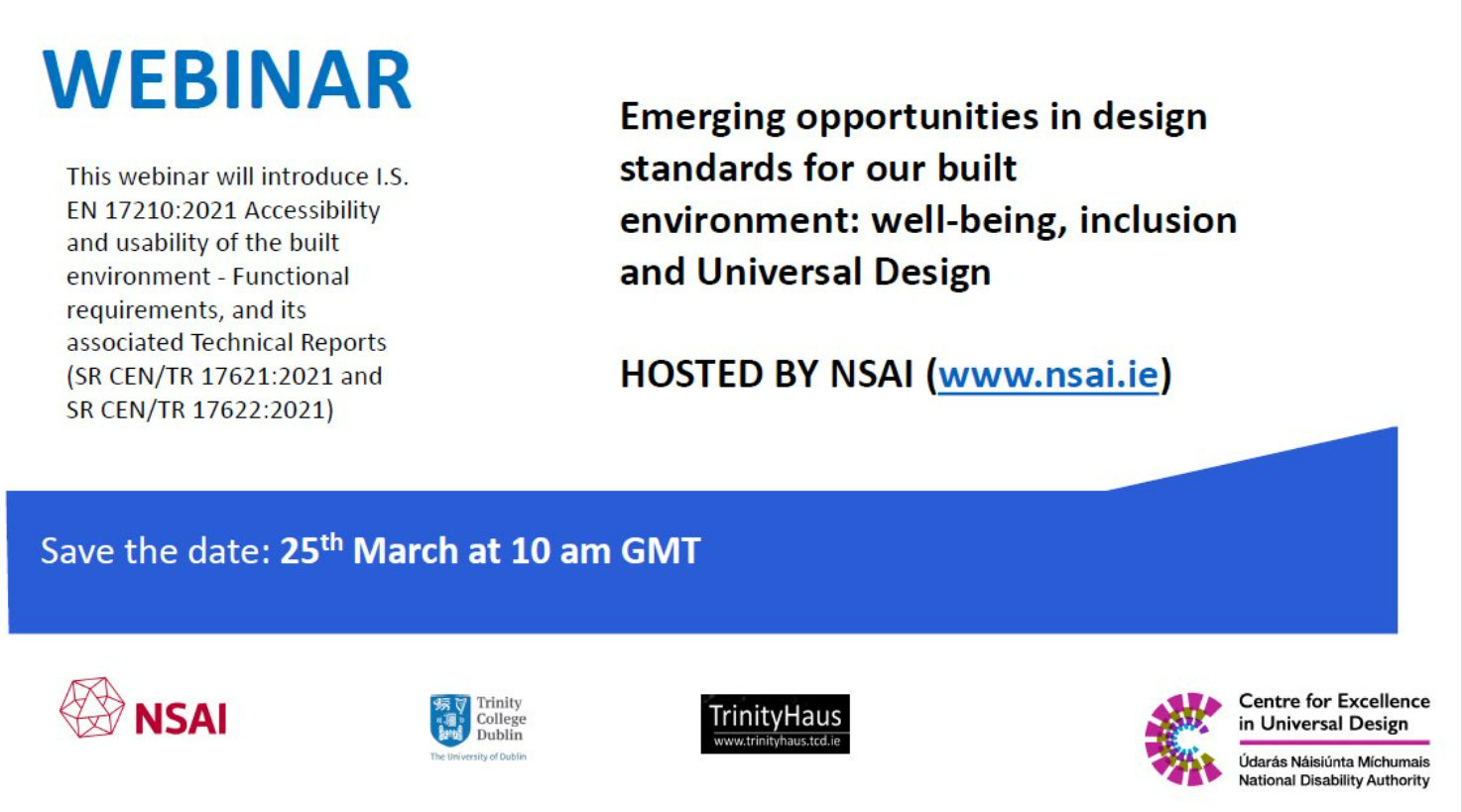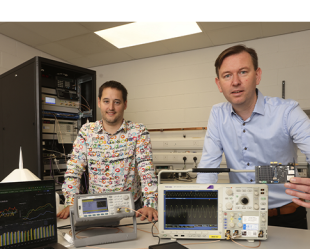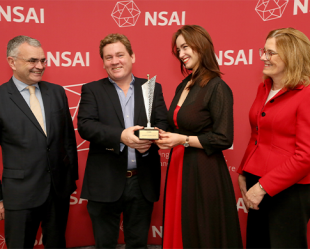The NSAI Committee (NSAI/TC23/SC1) on “Accessibility of the built environment” was established to facilitate involvement in the development of national, regional and international standards.
These new standards, the first standard at European level to address accessibility of the built environment were published in 2021. The national committee actively participated in the development of these new standards.
The standard I.S. EN 17210:2021 (Accessibility and usability of the built environment - Functional requirements) should be read in conjunction with its companion standard S.R. CEN/TR 17621 (Accessibility and usability of the built environment - Technical performance criteria and specifications) . The functional requirements and recommendations in I.S. EN 17210:2021 are formulated with qualitative terms and describe the objectives which have to be reached, based on the diversity that a wide range of users presents. It can be used as criteria for awarding public contracts (in support of the Public Procurement Directives) as well as for other purposes, i.e. for accessibility legislation. This document does not prescribe or describe how these functional requirements should be met and thus it is not intended that this document will conflict with national accessibility standards
S.R. CEN/TR 17621 exemplifies the technical performance criteria and specifications to fulfil the functional requirements given in I.S. EN 17210. It demonstrates a proposal, or proposals, to achieve the EN requirements and recommendations, drawing on performance criteria and specifications given in International Standard ISO 21542, where these exist and/or with examples from other standards and guidance documents, where relevant. Alternatively, national standards or regulations may be used to determine the technical performance criteria and specifications to fulfil the functional requirements of the EN 17210.
S.R. CEN/TR 17622( Accessibility and usability of the built environment - Conformity assessment) provides information on the built environment, accessibility conformity assessment refers to the suitability of accessibility in buildings (complete or part of them), or in urban public spaces or elements or areas thereof. These spaces may be in the project, construction or post-occupancy phase.
This NSAI Webinar which was held on the 25th of March 2022, to inform the various stakeholders of the publication of these standards and their importance both in the public and private sector. This 2 hour webinar, " Emerging opportunities in design standards for our built environment: well-being, inclusion and Universal Design”.," gives an overview of the standards.
A copy of the transcript can be found here
Our experiences of the pandemic and emergence from it have reinforced the importance of designing inclusive environments, workplaces and communities. There are opportunities for legislators, designers, clients, public and private organisations and advocates to play a fundamental role in shaping our built environment, from high-quality housing to public parks and buildings.
Universal Design is the process of designing and composing an environment so that it can be accessed, understood, and used to the greatest extent possible by all people, regardless of their age, size, ability or disability.
The new standard I.S. EN 17210:2021 (Accessibility and usability of the built environment - Functional requirements) can enable a transition from minimum legal obligations to good practice, by supporting the delivery of buildings and places with social, economic and sustainable value. An environment (or any building, product, or service inside it) should be designed to suit the needs and preferences of everyone who wants to use it.
Dr Ger Craddock, Chief Officer of CEUD (Centre for Excellence in Universal Design) and Chair of NSAI Universal Design Standards Consultative Committee (UDSCC) opened the Webinar.
During this webinar, several presentations were given by members of the NSAI/TC23 Technical Committee :
Presentations:
· Introduction and background to the Standards: Speakers - Tom Grey & Ruth O’Reilly
· I.S. EN 17210 in the Irish regulatory context: Speakers - Eoin O’Dowd & Caitríona Shaffrey
· Using the standards in daily practice: Speaker - Fionnuala Rogerson
NSAI CEO, Geraldine Larkin gave the Opening address followed by Selina Bonnie, Disability Liaison, Access and Equality Officer, South Dublin County Council who gave the Keynote Address on “Universal Design: the foundation of sustainable, vibrant communities”.
Anne Rabbitte, T.D., Minister of State with responsibility for Disability, Department of Children, Equality, Disability, Integration and Youth gave the closing address.
The Collection of Standards referred during this webinar can be found at these links :
Special Collection of standards
I.S. EN 17210 Collection 1:2021
Collection 1 contains the following 4 standards : I.S. EN 17210:2021, S.R. CEN/TR 17621:2021, S.R. CEN/TR 17622:2021 & ISO 21542:2021 [€300 (discount of 60%)]
Available here
I.S. EN 17210 Collection 2:2021
Collection 2 contains the following 2 standards : I.S. EN 17210:2021 & S.R. CEN/ 17621:2021 [€175 (discount of 60%)]
Available here
For further information contact Elizabeth O’Ferrall (elizabeth.oferrall@nsai.ie ), Project Manager at NSAI for Standards in the area of Universal Design, Accessibility and Usability




